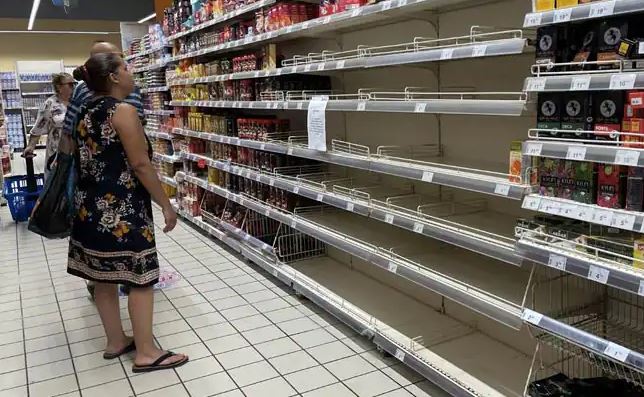In recent weeks, Tunisians have faced rising food costs and shortages of essentials, threatening to escalate the country’s simmering unrest and become the epicenter of the Arab Spring demonstrations.
Stores that sell sugar, vegetable oil, rice, and even bottled water occasionally stop carrying them.
For these basic foods, which have long been subsidized and are increasingly only available in rations, people wait in line for hours.
Many people are unable to pay the outrageous price for them when they are put on the stores.
Economic experts claim that Tunisia’s problems have been exacerbated by the government’s own budget crisis and its inability to negotiate a long-sought loan from the International Monetary Fund. The government has placed the blame on speculators, hoarders on the black market, and the conflict in Ukraine.
Fighting occasionally breaks out in the lines at food markets, and protests and run-ins with the law over rising costs and shortages have happened all over the nation.
A young fruit vendor who was on the street recently committed suicide in a suburb of Tunis after police took the scales he used to weigh his goods.
His desperate act brought up memories of Mohamed Bouazizi’s self-immolation in 2010, which sparked riots that resulted in the overthrow of longtime tyrant Zine El Abidine Ben Ali and provoked similar uprisings around the Arab world.
“I came to shop and found people fighting to buy and the prices were very high,” said shopper Amina Hamdi, despairing at trying to buy basic goods.
“It is not possible to live without food,” said Aicha during a recent shopping trip to the fish and meat market in Tunis. “We can live without furniture, construction material, but we have to eat.” She only gave her first name for fear of persecution by police for speaking out.
When the 20,000 tons of sugar from India were announced to be imported in time for Mouled, the Prophet Muhammad’s birthday, the Ministry of Commerce made a guarantee that shortages would end.
But the evening before the festival, people lined up in front of stores for hours in order to buy a package of sugar, which is needed to make traditional meals for the religious celebration.
Not everything is in low supply, even food. Lacking energy resources like those in its neighbors Libya and Algeria, Tunisia is severely dependent on imports, and due to its protracted economic problems, it has little negotiating power to get the products it needs on global markets.
Inflation has reached a record rate of 9.1%, the highest in three decades.
Last month, hundreds of people protested the degradation of their living conditions in the streets of Douar Hicher, a poor neighborhood outside of Tunis that is seen as a barometer of general unhappiness.
Demonstrators blocked the town’s major thoroughfare by lighting tires on fire while yelling “work, freedom, dignity,” the catchphrase of the 2010–2011 revolution. The police used tear gas to disperse the crowd.
“Enough of speeches and promises, people are gripped by hunger and poverty,” read a banner erected by the demonstrators, their anger at the government and political elites palpable.
Over the past year, President Kas Saied has given himself enormous powers after ousting the prime minister and dismissing parliament.
Many Tunisians supported the steps, which he claimed were essential to save the country amid a protracted political and economic crisis, but critics and Western supporters claim the coup threatens Tunisia’s fledgling democracy.
Saied blames “speculators” and individuals who have a monopoly on items they stockpile in illegal depots for the shortage of food supplies and the increase in costs.
He implied that Ennahdha, the Islamist movement and his primary political foe, had some sort of involvement, something the group categorically denies.
The Salvation Front, an alliance of five opposition parties and a number of independent organizations, claimed in a statement that the protests were an indication of “a widespread explosion and the breakdown of the social and political system.”
The state’s overstretched budget is to blame, according to Noureddine Taboubi, general secretary of the influential labor union UGTT.
To address a fiscal deficit made worse by the COVID-19 outbreak and the effects of Russia’s war in Ukraine, the government is now in negotiations with the IMF for a $2 billion to $4 billion loan. On Saturday, a senior Tunisian delegation traveled to Washington in an effort to seal the deal.
In exchange, Tunisia would be required to implement difficult changes, such as reducing the size of the country’s one of the major public administration sectors, which consumes around a third of the state budget.
According to the most recent data from the World Bank, the IMF is also calling for the progressive elimination of subsidies and the privatization of state-owned businesses, which would result in significant job losses and a worsening of the unemployment rate, which is already at 18%.
Tunisians are less reluctant to risk their lives when faced with such hopeless circumstances in order to travel to Europe in pursuit of a better life.
An NGO that regularly tracks migration, the Tunisian Forum for Economic and Social Rights, reports that 507 Tunisian migrants have died or gone missing so far in 2022.
From January to September 2022, the coast guard prevented more than 1,500 attempts at illegal immigration to Italy, involving entire families and approximately 2,500 youngsters, according to National Guard spokesman Houssameddine Jebabli.







